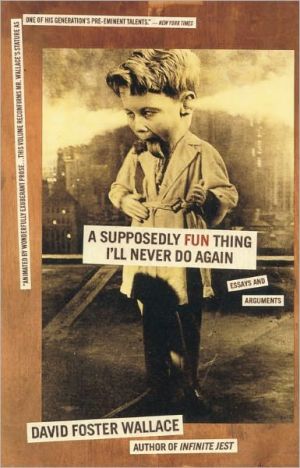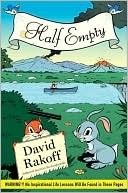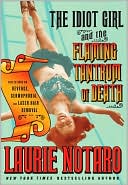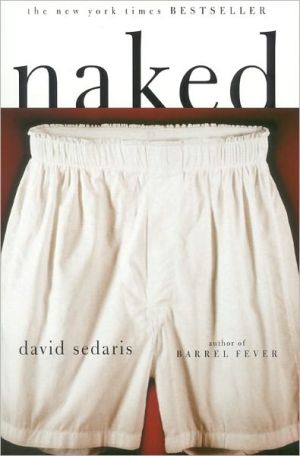A Supposedly Fun Thing I'll Never Do Again: Essays and Arguments
In this exuberantly praised book - a collection of seven pieces on subjects ranging from television to tennis, from the Illinois State Fair to the films of David Lynch, from postmodern literary theory to the supposed fun of traveling aboard a Caribbean luxury cruiseliner - David Foster Wallace brings to nonfiction the same curiosity, hilarity, and exhilarating verbal facility that has delighted readers of his fiction, including the bestselling Infinite Jest.\ \ \ The...
Search in google:
A collection of stories from David Foster Wallace is occasion to celebrate. These stories — which have been prominently serialized in Harper's, Esquire, the Paris Review, and elsewhere — explore intensely immediate states of mind, with the attention to voice and the extraordinary creative daring that have won Wallace his reputation as one of the most talented fiction writer of his generation.Among the stories are "The Depressed Person", a dazzling portrayal of a woman's mental state; "Adult World", which reveals a woman's agonized consideration of her confusing sexual relationship with her husband; and "Brief Interviews with Hideous Men", a dark, hilarious series of portraits of men whose fear of women renders them grotesque. Publishers WeeklyLike the tennis champs who fascinate him, novelist Wallace (Infinite Jest; The Broom of the System) makes what he does look effortless and yet inspired. His instinct for the colloquial puts his masters Pynchon and DeLillo to shame, and the humane sobriety that he brings to his subjects-fictional or factual-should serve as a model to anyone writing cultural comment, whether it takes the form of stories or of essays like these. Readers of Wallace's fiction will take special interest in this collection: critics have already mined "Derivative Sport in Tornado Alley" (Wallace's memoir of his tennis-playing days) for the biographical sources of Infinite Jest. The witty, insightful essays on David Lynch and TV are a reminder of how thoroughly Wallace has internalized the writing-and thinking-habits of Stanley Cavell, the plain-language philosopher at Harvard, Wallace's alma mater. The reportage (on the Illinois State Fair, the Canadian Open and a Caribbean Cruise) is perhaps best described as post-gonzo: funny, slight and self-conscious without Norman Mailer's or Hunter Thompson's braggadocio. Only in the more academic essays, on Dostoyevski and the scholar H.L. Hix, does Wallace's gee-whiz modesty get in the way of his arguments. Still, even these have their moments: at the end of the Dostoyevski essay, Wallace blurts out that he wants "passionately serious ideological contemporary fiction [that is] also ingenious and radiantly transcendent fiction." From most writers, that would be hot air; from one as honest, subtle and ambitious as Wallace, it has the sound of a promise. (Feb.)
1 Derivative Sport in Tornado Alley32 E Unibus Pluram: Television and U.S. Fiction213 Getting Away from Already Being Pretty Much Away from It All834 Greatly Exaggerated1385 David Lynch Keeps His Head1467 A Supposedly Fun Thing I'll Never Do Again256
\ Publishers Weekly - Publisher's Weekly\ Like the tennis champs who fascinate him, novelist Wallace Infinite Jest; The Broom of the System makes what he does look effortless and yet inspired. His instinct for the colloquial puts his masters Pynchon and DeLillo to shame, and the humane sobriety that he brings to his subjects-fictional or factual-should serve as a model to anyone writing cultural comment, whether it takes the form of stories or of essays like these. Readers of Wallace's fiction will take special interest in this collection: critics have already mined "Derivative Sport in Tornado Alley" Wallace's memoir of his tennis-playing days for the biographical sources of Infinite Jest. The witty, insightful essays on David Lynch and TV are a reminder of how thoroughly Wallace has internalized the writing-and thinking-habits of Stanley Cavell, the plain-language philosopher at Harvard, Wallace's alma mater. The reportage on the Illinois State Fair, the Canadian Open and a Caribbean Cruise is perhaps best described as post-gonzo: funny, slight and self-conscious without Norman Mailer's or Hunter Thompson's braggadocio. Only in the more academic essays, on Dostoyevski and the scholar H.L. Hix, does Wallace's gee-whiz modesty get in the way of his arguments. Still, even these have their moments: at the end of the Dostoyevski essay, Wallace blurts out that he wants "passionately serious ideological contemporary fiction [that is] also ingenious and radiantly transcendent fiction." From most writers, that would be hot air; from one as honest, subtle and ambitious as Wallace, it has the sound of a promise. Feb.\ \ \ \ \ Library JournalThis collection of eight diverse articles, following on the heels of Foster's immense, popular novel, Infinite Jest (LJ 1/96), opens with "Derivative Sport in Tornado Alley," an autobiographical sketch that skillfully interweaves mathematics and tennis with the vicissitudes of Midwestern meteorology. A brilliant analysis of television's role in popular culture, a look at the Illinois State Fair, a review of filmmaker David Lynch, and a report on Wallace's week-long adventure on a luxury cruise are among the pieces that follow. Wallace's style is highly personal-some might say eccentric-but his writing is always intelligent, witty, and engaging. Libraries serving discriminating readers will want this book in their collections..-William Gargan, Brooklyn Coll. Lib., CUNY\ \ \ Kirkus ReviewsThis collection of essays by hot novelist Wallace (Infinite Jest, 1996, etc.) is sometimes tiresome but often truly rewarding.\ Wallace is a fine prose stylist of the post-Beat school. His long sentences overflow with prepositional phrases; commas are scarce. At his best—which is to say, about half the time here—Wallace writes with an intensity that transforms rambling reportage into a sui generis mode of weird philosophizing. He makes deft use of footnotes to pile up insights beneath the flow of his main line of thought. Especially brilliant is the collection's opening essay, in which Wallace looks back on his childhood experiences as a midwestern junior tennis star through the lens of his collegiate obsession with mathematics. The tennis world, treated at length in Infinite Jest, resurfaces in a sensitive profile of rising American player Michael Joyce. Otherwise, Wallace's best work comes in two pieces that originally appeared in Harper's: a ferocious investigative report on the culture of luxury cruises, and the record of another carnival voyage, this one a trip to the Illinois State Fair. A book review competently discusses literary-theoretical debates over the death-of-the-author thesis. Elsewhere in the volume, Wallace takes determined dives into banality. A more judicious, albeit less focused, effort finds Wallace on the set with filmmaker David Lynch, whom he presents as a contemporary artistic hero. A sprawling meditation on televison and contemporary fiction lays out many intriguing theories, but its main point, that TV irony snares rather than liberates viewers, doesn't make news.\ At his best, the exuberant Wallace amazes with his "Taoistic ability to control via noncontrol." But—to continue quoting from his opening tour-de-force, "Derivative Sport in Tornado Alley"—eschewing discipline exacts a price: "Force without law has no shape, only tendency and duration."\ \ \








